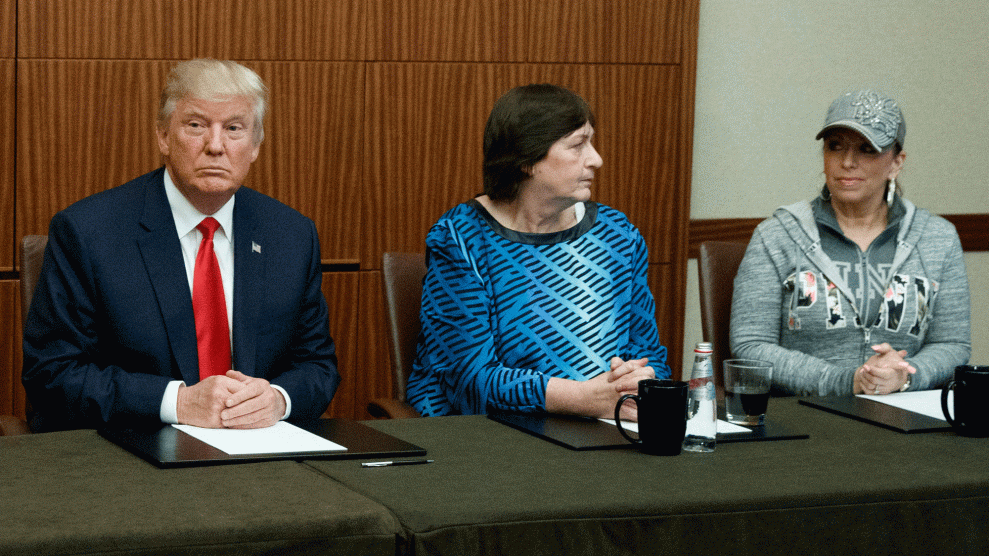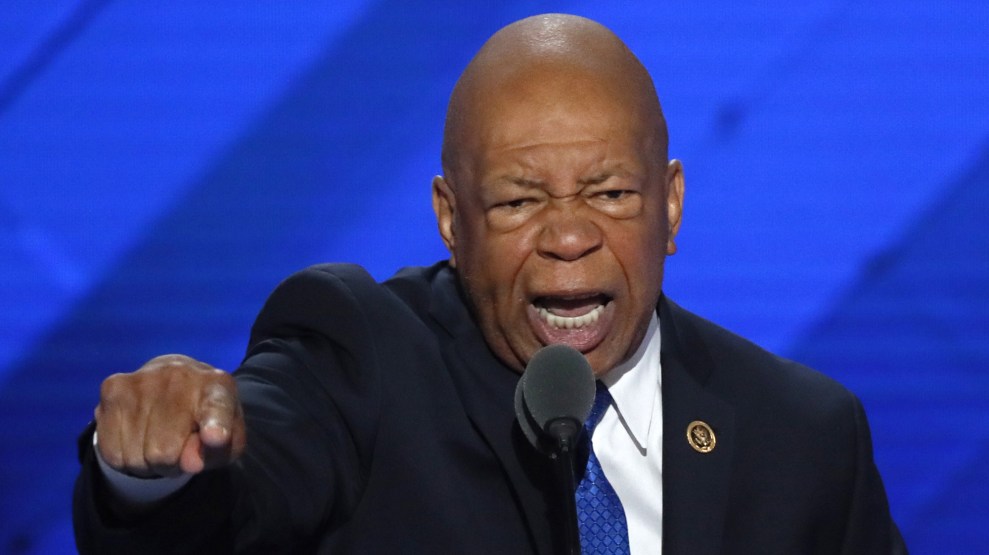
President-elect Donald Trump with Bill Clinton accuser Paula Jones (far right), at a press conference before a presidential debate.AP Photo/ Evan Vucci
Update (3/28/17): One of the many pending lawsuits that accompanied Donald Trump into the Oval Office was a case brought by Summer Zervos, an Apprentice contestant who alleged during the presidential campaign that Trump had sexually harassed and assaulted her. Trump accused Zervos of lying and staging a “hoax,” prompting Zervos to file suit for defamation. In a court filing this week, Trump lawyer Marc Kasowitz indicated that the President would argue that he is immune from civil litigation during his presidency. Kasowitz asserted that the question of presidential immunity had not been fully answered in the 1997 Supreme Court case involving Bill Clinton accuser Paul Jones. Read on for why that argument might not fly—and why Trump has Kellyanne Conway’s husband, who’s expected to be nominated for a top Justice Department job, to thank for that.
When he moves into the White House in January, Donald Trump will bring with him some unusual baggage: a long list of pending lawsuits in which he is either a plaintiff or a defendant. And just because he’ll be president doesn’t mean these cases are going away. For this, Trump can thank Paula Jones and the husband of his campaign manager, Kellyanne Conway.
By USA Today‘s count, Trump is involved in at least 75 ongoing cases. They include the numerous fraud lawsuits targeting the president-elect’s now-defunct Trump University, which encouraged students to take out hefty loans in order to enroll in its get-rich-quick real estate seminars. A trial in a class-action lawsuit against Trump University is scheduled to begin in California on November 28, though Trump’s lawyers have asked to postpone the case until after his inauguration. During his presidency, Trump won’t be able to avoid potentially embarrassing court proceedings, depositions, and even the possibility of appearing as a witness in court. The law is clear that a sitting president can be sued for private conduct—which brings us to the Paula Jones story.
In 1994, Jones—who was among a group of Bill Clinton accusers Trump assembled at a press conference before the second presidential debate—sued then-President Clinton for sexual harassment. Ann Coulter, a major supporter of Trump’s presidential bid, was reportedly the ghostwriter of Jones’ legal complaint. Clinton tried to fend off the suit by asserting presidential immunity, which protects the president from lawsuits over conduct while in office. But Jones argued that her case involved actions that had occurred before Clinton took office. Jones’ lawsuit resulted in a 1997 Supreme Court decision in her favor that now ensures that all the civil suits currently pending against Trump—and any that may yet be filed concerning his business or private life—can go forward while he’s in office. Because of this ruling, Trump can be forced to testify, produce evidence, submit to depositions, and ultimately pay judgments in cases he loses.
Jones’ Supreme Court victory was due in part to the work of George Conway III, a Republican lawyer who is married to Trump’s campaign manager, Kellyanne Conway. When Jones’ case first became public in May 1994, Conway was a 30-something lawyer at the law firm Wachtell, Lipton, Rosen & Katz and a member of the Federalist Society, a conservative legal group. Conway penned an op-ed in the Los Angeles Times arguing that Clinton was relying on dubious legal arguments. “In a case involving his private conduct, a President should be treated like any private citizen,” he wrote. “The rule of law requires no more—and no less.”
The op-ed brought Conway to the attention of Jones’ lawyers, Gilbert Davis and Joseph Cammarata. (Cammarata now represents seven women accusing Bill Cosby of sexual assault and other charges.) Subsequently, Conway spent several years quietly working pro-bono with Jones’ legal team and a group of other conservative lawyers. This crew ultimately exposed Clinton’s affair with Monica Lewinsky and sparked impeachment proceedings against the president.
In 1996, the 8th Circuit Court of Appeals ruled that the case should move forward, saying that it could find no “case in which any public official ever has been granted any immunity from suit for his unofficial acts.” Clinton appealed the decision, asking the Supreme Court to delay the trial until after he left office. Conway wrote the Supreme Court brief for Jones. In a unanimous decision written by liberal Justice John Paul Stevens, the court agreed with Conway, and the Jones case proceeded. Clinton was subsequently forced to submit to hours of depositions in the case—a first for a sitting president. Jones ultimately settled with Clinton for $850,000.
During the 2016 presidential campaign, Trump brought Jones back into the spotlight, resurrecting her allegations against Bill Clinton. Yet the Jones case could ensure Trump will be embroiled in civil litigation for years to come as president.
All the arguments that Conway made on Jones’ behalf will apply to Trump. He could, of course, settle all the pending suits he’s involved in. Trump said repeatedly during the campaign that he did not want to settle the Trump University class-action suit that is slated to go to trial later this month. The lawsuit was filed by former students of Trump’s for-profit real estate academy who allege that they were collectively defrauded of millions of dollars for classes that were supposed to teach them the secrets of Trump’s real estate success but only left them deeper in debt. Trump appeared in promotional materials for the company and suggested its courses were better than those of any Ivy League business school. (The judge making final decisions on the scheduling of the trial, expected to last at least four to six weeks, is US District Judge Gonzalo Curiel, who Trump infamously accused of having an “absolute conflict” in the case because of his “Mexican heritage.”)
The case promises to be a big distraction from his agenda and could be a potential embarrassment to his new administration. A Trump attorney last week told Curiel that he was willing to start settlement talks with the plaintiffs, but Patrick Coughlin, a lawyer for the defendants, told reporters that previous settlement efforts had failed. “We’ve been miles apart,” he said.
And there are at least two other lawsuits against the president-elect over Trump University alone. This includes a case brought by New York Attorney General Eric Schneiderman, whose office is also investigating the Trump Foundation.
There is still one way Trump can avoid the barrage of lawsuits he’s enmeshed in, at least for a while. In its decision in Clinton v. Jones, the Supreme Court noted that Congress could pass legislation to shield sitting presidents from civil suits. Will Trump ask the Republican Congress to protect him from legal action? If that’s his plan, he’d better act soon. The Trump University trial could start before the Thanksgiving leftovers are gone.

















